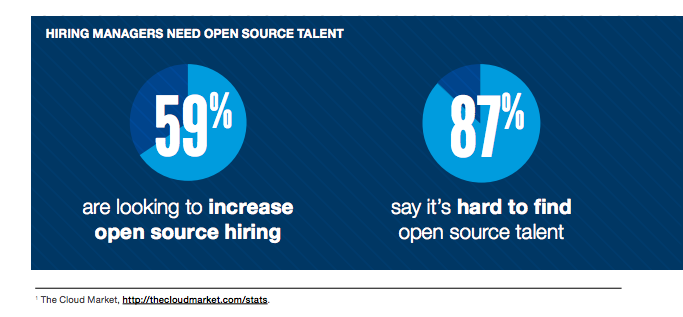
Hiring managers say that open-source hiring will increase over the next six months, according to a 2016 Open Source Jobs Report that was released today.
The survey was released by Dice and the Linux Foundation, and it is the fifth year they have released the survey. Since open source is an important part of businesses, the organizations expanded the report this year to examine the broader job market for open-source professionals.
Other key findings from the survey included open-source talent being one of the top priorities for recruitment this year. The survey said that 59% of hiring managers said they will add more open-source professionals to their ranks in the next six months. This is compared to the report for Linux-specific jobs last year, which found 50% planned to add Linux talent during the same time period.
The survey also found 58% of hiring managers are looking for DevOps professionals, while the need for developers is still a top position on their list at 74%. Only 2% of professionals said that money and perks were the best part of their jobs, and the rest said working on projects and technology challenges were high on their list of importance.
The full 2016 Open Source Jobs Report is available to download for free.
Introducing the AI Games
For competitive developers who also want to develop artificial intelligence bots, there is now a competition hub where developers can challenge each other to code bots that can compete with others to win prizes and learn new coding skills.
The AI Games is a competition showcase for developers, filled with competitions like Ultimate Tic Tac Toe, Four in a Row, Go, and AI Block Battle, to name a few. Some of the competitions are in beta, so developers can look and report bugs or issues they come across while battling their bots.
Developers can code their bots in their preferred language, and there are 22 languages for the growing amount of competitions on the AI Games. Some of the languages supported include Java, JavaScript, Perl, PHP, Python, Ruby, Scala and more. Starter bots are available for those who do not have experience with their language of choice.
Right now there are about 2,558 active players and 76,213 bot revisions. Developers can start challenging their bots today, and can join discussions about how developers can improve the website and about the challenges.
iOS 9 supporting IPv6-only networks
In 2015, Apple announced the transition to IPv6-only network services in iOS 9. Starting June 1, all apps submitted to the app store must support IPv6-only networking.
Most of these apps will not require any changes because IPv6 is already supported by NSURLSession and CFNetwork APIs, according to Apple. For developers who have an app that uses IPv4-specific APIs or hard-coded IP addresses, they will need to make changes to make sure there is compatibility.
There are major network service providers that are actively promoting and deploying IPv6 due to a variety of factors, according to the Mac Developer Library. IPv6 is more efficient than IPv4, it avoids the need for network address translation (NAT), it provides fast routing through the network, and it prevents network fragmentation.
Developers can ensure they have compatibility here.
Ruby on Google App Engine going beta
Ruby on Rails makes it easy for developers to build their Web applications and APIs for the cloud, which is why Google announced that Ruby runtime on Google App Engine is going beta. App Engine provides a platform for developers to build, deploy and manage services on Google’s infrastructure, according to a Google Cloud Platform blog post.
Google has created a collection of guides and tutorials for developers who need help getting started with Ruby on App Engine. Some of these tutorials include a walkthrough for creating code, how to use Google’s APIs and services, and how to deploy to production.
With Ruby on App Engine, developers can use Rails, Sinatra or other Web frameworks to build an app. Cloud Datastore, MySQL or PostgreSQL can be used to store data, and it is easy for developers to migrate to Google Container Engine or Google Computer Engine for more flexibility, according to the Google blog.





